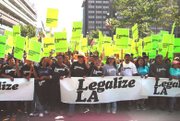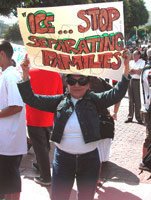American Apparel Workers March for Immigration Reform
About 1,000 American Apparel workers participated in May Day marches in Los Angeles, joining thousands of others in a mostly peaceful demonstration for immigration reform and less policing by the federal government.
The workers, carrying yellow signs reading “Legalize L.A.: Immigration Reform” and wearing Legalize L.A. T-shirts, marched from their factory at Alameda and Seventh Street up to the main podium at First and Broadway, joining an estimated 20,000 to 30,000 others.
Many of the 5,000 workers at the company’s downtown Los Angeles garment factory are immigrants and support less bureaucracy within immigration regulation and enforcement as well as more-open borders.
“This is a nice way to unite everybody together in a peaceful way,” said Juan Prado, an American Apparel shipping-department worker. “This is a way to tell people what we need, and it addresses not just the people with [documentation issues] but those who represent us.”
Carlos Lopez, another company employee who joined the march, added, “This is about unity and freedom.”
American Apparel Chief Executive Officer Dov Charney has long been an advocate for workers rights and helped stage the march. Earlier in the week, he took a stand against another issue: the continuing raids on businesses by the Immigration and Customs Enforcement division of the Department of Homeland Security.
On April 29, Charney joined California State Assemblyman and Speaker Fabian Nuacute;ntilde;ez (D—Los Angeles) in front of the company’s massive Alameda Street factory in support of a moratorium on the raids.
American Apparel itself has not been the subjects of any raids, but the company acknowledged that it was recently asked by ICE to provide I-9 forms from its workers. The forms provide proof the workers are fully documented and are legal to work in the United States. The company provided the agency with those forms in January but stressed that even if no laws are broken, the action may create an aura of fear, scaring employees and prospective employees.
Los Angeles Mayor Antonio Villaraigosa has also joined the effort, saying that the DHS should focus on illegal immigrants who are involved in gangs and crime, rather than those working for private business.
American Apparel counsel Peter A. Schey echoed that sentiment: “American Apparel believes that ICE should focus its limited resources to detect and prosecute human traffickers, violent criminals and employers who violate the law by exploiting immigrant labor. The fact that almost every major manufacturing, agricultural and service-industry enterprise in urban areas with high immigrant populations has some number of workers using unauthorized documents despite the company’s full compliance with federal employee-verification laws is hardly the company’s fault. It is the fault of a broken immigration system.”
At the April 29 event, Nuacute;ntilde;ez released a letter to DHS Secretary Michael Chertoff signed by Nuacute;ntilde;ez and 28 other members of the state Assembly calling for a moratorium on the raids, citing one case in particular in February that took place at a Van Nuys, Calif., toner and ink company. During that raid, Nuacute;ntilde;ez said, ICE officials denied workers access to legal counsel and held legal residents against their will.
Schey added that the federal government needs to take a different approach, including holding discussions with the company to assess how workers using unauthorized documents can be terminated in a phased approach so that a blameless company, blameless shareholders and blameless U.S. workers are not punished economically as a group for something they had no control over.
DHS spokesperson Laura Keener said the raids have been a response to current law. “If the mayors and such are unhappy with all this, they need to talk to Congress about fixing the laws,” she said. “We’ve been very clear on our commitment of securing the homeland hellip; and we will continue to crack down on employers who hire illegal workers. —Robert McAllister























